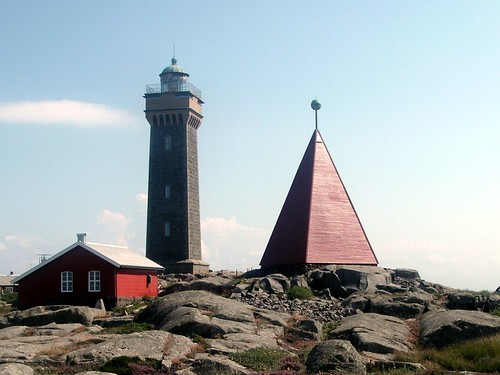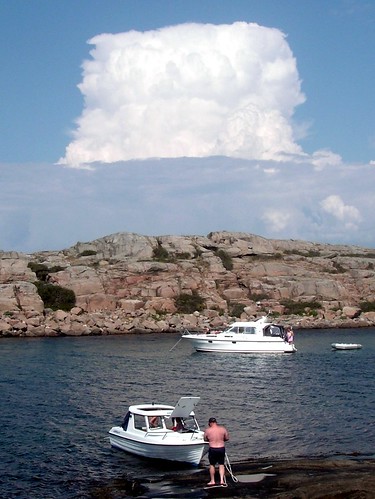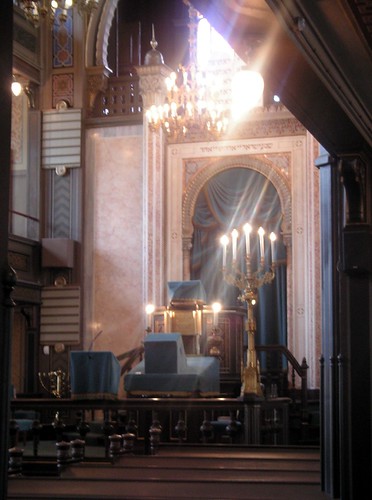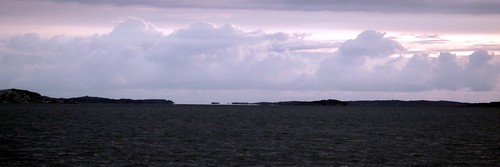Rain(Monday 31st July) The weather broke today, rain sheeting down from a heavy grey sky (though still warm). I spent most of the morning and early afternoon writing and uploading my chronicle of the previous week, editing and uploading photos. It was also the last day of the month for Flickr; 20 megabytes a month and I had only used about 50% of my total, so I filled it up with pictures from my expedition in search of Gamla Älvsborg the previous weekend.
So last week I was a day or so behind with the week’s blog, and now it’s a Thursday afternoon and I’m four days behind. Oh well, I’ll only be doing this day-on-day for one more week. (Four more days now.) After that school’s back and I will have much less time to Observe Gothenburg – not least because I will be living, on and off, in Falköping during the weeks.
Changeable(Tuesday 1st August) The weather is changeable, so though it’s dry and sunny while I’m wandering through Trädgårdsföreneingen’s park, I can see the clouds piling up over there in the west. Trädgårdsföreningen translates (approximately) as “The Garden Association”, and is a park, laid out on what used to be part of the empty field of fire ground around the demolished city walls. It’s “in the English style”. I still have to find out a bit more of the history…
(To visit Trädgårdsföreningen's home page - all in Swedish - click here.)
I’m meeting friends at Hotel Eggers. In view of the heat we want to meet out of doors, in view of the piling clouds we choose a table well under the awnings. Good choice. When the heavens open a bit later we are snug and dry and able to comfortably watch everyone out on the street sprinting for cover. Monica (who used to work at Eggers) keeps remembering tit-bits about the history of the hotel. Example: During the Second World War the hotel was the venue for a meeting between German and Norwegian officials prior to the official capitulation of Norway. Gothenburg was a convenient neutral ground. The Germans wanted the hotel to fly the Nazi flag, but the owner, Axel Eggers, wasn’t charmed by the idea. On the other hand, refusing these guests might be dangerous. His solution was to have all the hotel’s flagpoles sent away for repair and repainting. No flag poles – no flags. An elegant solution. (Of course, I suppose he’d have had to have done it at the last moment to avoid any German offers to bring their own flag staff.)
(Click here to read Hotel Egger's own account of their history.)
Thunder(Wednesday 2nd August) This afternoon I met two other friends for supper. We’d all, variously, been shopping and needed to contact one another to decide where to meet and when. I was at home when Lena called on her mobile – a flash of lighting, rolling thunder and the skies opened. The rain was falling so violently around her it was setting off car alarms, so it was hard to hear her speak. Plantagegatan, the pasta restaurant next door to the English shop. We sat and talked and eavesdropped on the chat-up lines which the middle-aged, long hair, fat guy at the only other occupied table was using on his much younger female companion. Apparently, claiming to write pop songs for boy-bands seems to work … at least, she was still with him and still listening when we left. Of course, he had trapped into a corner of the room by sitting next to her behind the table. The only way out would have been under or over the table.
Showers with sunny spells(Thursday 3rd August) To what extent can the life of a human being and the life of a city be compared? I try this out on Agneta as we walk in to the city in the morning, and continue to mull it over during the rest of the day. Both a person and a city are created, planned or unplanned, both grow, both develop, both face trials they must overcome and both experience happy times when all seems to be going well. Early expectations may be realised, or development may respond to unforeseen events and conditions. Both grow old, both can die. Agneta asks: At what point can a city be described as adult? Is it when the city becomes independent of its mother country? (Thinking of the Ancient Greek polis or a modern city like Singapore.) Or is it when the city itself gives rise to further cities? (Colonialism in the Greek or Carthaginian sense, or the modern establishment of green-field suburbs.) I am still turning this over in my mind when I meet Martin at lunch. Martin prefers to compare a city with an organism – and I see that. We talk about dead cities: Machu Pichu, Pompeii.
Weather suspended(Friday 4th August) The English pride themselves on the variety of ways they have to describe the weather, but you can’t say: The weather today will be suspended. In Swedish, you can: Uppehålls väder. Thus it was on Friday. Most of this day I worked on other things – in particular articles and teaching suggestions for working with poetry. I’m choosing famous pieces of English language verse and putting together a series of worksheets. There will be one published each week from next week under the title of “Poem of the Week”. I’m doing this for a publishing company called
Mera Förlag who will be bundling Poem of the Week with their English language “News Quiz” (which I’m also responsible for translating). The target audiences are secondary school classes and perhaps adult education study circles.
Fine and sunny
(Saturday 5th August) Perfect weather for our long planned expedition on the Göta Canal. Early morning bus from Gothenburg to Sjötorp on Lake Vännern (third largest inland sea in Europe). Transfer to the canal cruiser
MS Bellevue (carrying on this occasion nearly 200 passengers). Cruise up the canal to Töreboda, a distance of about 15km, through 16 locks with a rise of more then 40 metres. Bus back to Gothenburg. Very enjoyable, if a bit crowded.
The final lock we passed through was the upper lock at Hajstorp (literally Shark’s Thorpe or Shark’s Homestead – a name to conjure with – this is out in the middle of a bucolic landscape where trees and bushes line the canal and cattle come down to drink at the water’s edge). The opening of this lock in 1832 marked the completion of the canal, which had taken more than 22 years to build, and which gave Sweden a navigable waterway from the Baltic in the East to the North Sea and the Atlantic in the West. The lock and the canal were officially opened by King Karl XIII Johan (a.k.a. Jean-Baptiste Bernadotte). All the locks along the canal are identified geographically (e.g.
Hajstorps övresluss = Hajstorp’s Upper lock), but each lock also has an official name, and the official name of the Hajstorp’s Upper lock is the Thomas Telford Lock. It is named after the great Scots engineer and canal builder who advised on the Göta Canal and recruited foremen for its construction from among the corps of engineers he had himself trained up. I’ve tried (as yet in vain) to find anything written about these people. There must have been, at the very least, a few letters back to Telford, which could mean they are preserved with Telford’s own correspondence on the canal in the library of the Society of Engineers in London. Wouldn’t it be great, though, to have one of the foremen turn out to be a diarist or enthusiastic letter writer?
(You can see a commercial English language site dedicated to the Göta Canal here.)Sunny, mercury rising(Sunday 6th August) Out to the seaside to swim and sunbathe. First time for me in the sea this year.
Hot and sunny(Monday 7th August) Today spent in shade recovering from too much sun on Sunday. I worked on Poem of the Week rather than anything else.
Warm and sunny but cloudy towards the end of the day
(Tuesday 8th August) To Vinga. Vinga is the island furthest out in the Gothenburg archipelago, the first and last sight of Gothenburg for ships on their way in or out of port here. It holds a special place in the heart of all true Gothenburgers, partly because everyone is familiar with it from ferry trips to Denmark, England or Germany, partly because on clear days the various lighthouses and signal stations at Vinga are visible in silhouette from the city, and because the light itself is clearly visible at night – a double white flash every 30 seconds. But Vinga’s most important claim to fame is Evert Taube, the lighthouse keeper’s son, born in Gothenburg in 1890, brought up on Vinga till he was 14, who sailed the world as a seaman and then became Sweden’s foremost balladeer. A composer and singer of songs celebrating the sea, the travelling life and the beauties of the Swedish west coast. His statue stands in the harbour near the new Opera House, gazing out towards Vinga.
On the island there’s a museum dedicated to Taube, but I couldn’t find it. (I admit to not looking very hard.)
The ferry trip out to the island from Gothenburg takes about 1½ hours, and once out there, you’re stuck for 4½ hours till you can take the boat back. (Unless you can persuade a charitable yachtsman to take you off earlier, that is.) It’s a good idea to go as we did, prepared for a day in the sun with protection factor 30 cream, a swimsuit, a good sun hat and a picnic. Then it’s a fun day out.
(Here's a Swedish internet page dedicated to Vinga.)My travelling companions are of the opinion that I should include a diatribe on the subject of inconsiderate motorboat owners who try to moor right over the best spots for swimming from the rocks in the long bay to the north of the island, but I wasn’t there for the argument, so I will just draw a veil over it. The whole seems to have resulted in a fairly typical Swedish compromise.
Generally fine, but changeable with the possibility of showers
(Wednesday 9th August) Two fun things today. A guided tour of the main Gothenburg synagogue – 151 years old – which was fascinating as much for the tour and the history as for the questions the (mostly Swedish thus mostly Lutheran) visitors put. “What is the biggest difference between Judaism and Christianity?” Answers on a postcard, please ...
In the evening Agneta and I took the Hisingen Round Tour. The
MS Carl Michael Bellman, sailed from the pier at Lilla Bommen at 6 p.m., up the southern river to Bohus Castle, down the northern river to the sea, around the coast and back up the southern river again to the city. A tour of about 4 hours with a very nice (and expensive) meal along the way. The trip deserves an entry of its own. Maybe a little later. Probably call it Coasting.
Thunder and rain(Thursday 10th August) Another day indoors – writing all this up. But I’m up to date at least!









